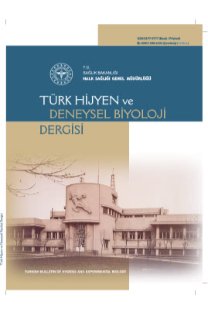İlaç ve gıda takviyelerinin içerikleri hakkında kullanıcıların bilgi ve talep düzeyinin ölçülmesi
Measuring level of information and demand of users about the content of drug and food supplements
___
- 1. Trevor AJ, Katzung BG, Masters SB, Katzung & Trevor Farmakoloji, 6. Baskı Nobel Tıp Kitabevleri: İstanbul, s:1, 2005.
- 2. Kayaalp SO, Akılcıl Tedavi Yönünden Tıbbi Farmakoloji, 1. Cilt, 13. Baskı, Pelikan Yayıncılık, Ankara, s:3, 2012.
- 3. Takviye Edici Gıdaların İthalatı, Üretimi, İşlenmesi ve Piyasaya Arzına İlişkin Yönetmelik. http://www.resmigazete.gov.tr/ eskiler/2013/05/20130502-14.htm (erişim tarihi: 15.07.2018).
- 4. KLAMOKS BID 1000 mg 14 film tablet Kısa Ürün Bilgisi PDF Dosyası. http://www.ilacrehberi.com/ pdfs/klamoks-bid-1000-mg-14-film-tablet-b11e/ kub/ (erişim tarihi: 15.07.2018).
- 5. DRAMAMINE 50 mg 12 tablet Kısa Ürün Bilgisi PDF Dosyası. http://www.ilacrehberi.com/pdfs/ dramamine-50-mg-12-tablet-8c38/kub/ (erişim tarihi: 15.07.2018).
- 6. Voonka Tween Multivitamin - Balık Yağı Şurubu 150ml. http://www.eczane.com.tr/voonkatween- multivitamin-balik-yagi-surubu (erişim tarihi: 15.07.2018).
- 7. Akpınar S, Hasta-Eczacı İlişkisi Algı Düzeyi İle Hastanın Eczaneye Güveni, Sadakati, Ve Memnuniyeti Arasındaki İlişki, Yüksek Lisans Tezi, Beykent Üniversitesi Sosyal Bilimler Enstitüsü, İşletme Yönetimi Ana Bilim Dalı Hastane Ve Sağlık Kurumları Yönetimi, s: 23, 2015.
- 8. Hayran O, Özbek H, Sağlık Bilimlerinde Araştırma ve İstatistik Yöntemler, 3. Baskı, Nobel Tıp Kitabevleri, s: 257-80, 2021.
- 9. Faul F, Erdfelder E, Lang AG, Buchner A, G*Power 3: A flexible statistical power analysis program for the social, behavioral, and biomedical sciences. Behavior Research Methods, 39, 175-91, 2007.
- 10. Faul F, Erdfelder E, Buchner A, Lang AG, Statistical power analyses using G*Power 3.1: Tests for correlation and regression analyses. Behavior Research Methods, 41, 1149-60, 2009.
- 11. Yapıcı G, Balıkçı S, Uğur Ö, Birinci basamak sağlık kuruluşuna başvuranların ilaç kullanımı konusundaki tutum ve davranışları, Dicle Tıp Derg, 38(4): 458-65, 2011.
- 12. İlaç Endüstrisi İşverenler Sendikası (İEİS) Basın Açıklaması, Ülkemizin “İlaç Kullanım Davranışları” Belirlendi. http://www.ieis.org.tr/ieis/tr/ press/14/ulkemizin-ilac-kullanim-davranislaribelirlendi (erişim tarihi: 15.07.2018).
- 13. Demirbağ BC, Timur M, Bir Grup Yaşlının İlaç Kullanımı İle İlgili Bilgi, Tutum ve Davranışları, Ankara Sağlık Hizmetleri Dergisi, 11(1): 1-8, 2012.
- 14. Saygılı M, Özer Ö, Hekimlerin Akılcı İlaç Kullanımına Yönelik Bilgi, Tutum ve Davranışlarının Değerlendirilmesi, Hacettepe Sağlık İdaresi Dergisi, 18(1): 35-46, 2015.
- 15. Özel Ç, Özcan Büyüktanır BG, Akılcı İlaç Kullanımında Hekimin ve Eczacının Hastayı Aydınlatma Yükümlülüğü, İÜHFM C. LXVI, S.2, s. 327-44, 2008.
- 16. T.C. İçişleri Bakanlığı, Emniyet Genel Müdürlüğü, 2017 Türkiye Uyuşturucu Raporu (2016 verileri), Ankara 2017.
- 17. T.C. Sağlık Bakanlığı, Türkiye Halk Sağlığı Kurumu, Türkiye Kronik Hastalıklar ve Risk Faktörleri Sıklığı Çalışması, Ed: Ünal B, Ergör G, Ankara 2013.
- 18. Canbolat C, Yaman M, Hatay İlinde Yaşayan Faklı Dini İnançlara Mensup Bireylerin Gastronomik Etkileşimi, Journal of Tourism and Gastronomy Studies, 5(1): 96-104, 2017.
- 19. Sattar SP, Ahmed MS, Madison J et al., Patient and Physician Attitudes to Using Medications with Religious Forbidden İngredients, SAGE, 38(11):1830-5, 2004.
- 20. Türk Tabipler Birliği (TTB), Aydınlatılmış Onam Kılavuzu. http://www.ttb.org.tr/mevzuat/index. php?option=com_content&view=article&id=983:o nam&Itemid=65 (erişim tarihi: 15.07.2018).
- 21. 2UNICEF, İnsan Hakları Evrensel Beyannamesi. https://www.unicef.org/turkey/udhr/_gi17.html (erişim tarihi: 15.07.2018).
- 22. Temiz Ö, Türk Hukukunda Bir Temel Hak Olarak Sağlık Hakkı, Ankara Üniversitesi SBF Dergisi, 69(1): 165-88, 2014.
- 23. Hasta Hakları Yönetmeliği. http://www.tard.org. tr/assets/hukuk/hastahaklari.pdf (erişim tarihi: 15.07.2018).
- ISSN: 0377-9777
- Başlangıç: 1938
- Yayıncı: Türkiye Halk Sağlığı Kurumu
İlaç ve gıda takviyelerinin içerikleri hakkında kullanıcıların bilgi ve talep düzeyinin ölçülmesi
Hanefi ÖZBEK, Vildan ÖZCAN, Ayşe Arzu ŞAKUL
Miyokardit tanılı immünokompetan hastada Salmonella enteritidis saptanması
Fatih Emin ÖZTÜRK, Yasin YILDIZ, Dilek YAĞCI ÇAĞLAYIK
Gülizar AYDOĞDU, Çağlar ADIGÜZEL, Hakkı TAŞTAN, Yusuf KALENDER, Hatice BAŞ, Fatma Gökçe APAYDIN, Suna KALENDER
COVID-19 maliyetleri; Türkiye’de bir il örneği
Hüseyin ASLAN, İsmail ŞİMŞİR, Elif KÖSE, Gülsen TOPAKTAŞ
Arif Doğan HABİLOĞLU, Gönül ÇİÇEK ŞENTÜRK, Yunus GÜRBÜZ, Ezgi Gizem ŞIBAR, Esengül ŞENDAĞ, Nilgün ALTIN, İrfan ŞENCAN
Serpil ÇEÇEN, Dilek YAĞCI ÇAĞLAYIK, Can ILGIN
Oral kaviteye yerleşen parazitler
Başak KARASU, Özcan ÖZKAN, Ayşegül TAYLAN ÖZKAN
Sub-Kronik stresin neden olduğu depresyon ve anksiyete bozukluklarında tDAS’ın etkileri
